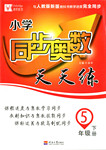题目内容
—What does your uncle ______ ?
—He is tall. He has short curly hair.
A. look at B. like C. looks like D. look like
练习册系列答案
 精英口算卡系列答案
精英口算卡系列答案 应用题点拨系列答案
应用题点拨系列答案 状元及第系列答案
状元及第系列答案 同步奥数系列答案
同步奥数系列答案
相关题目
题目内容
—What does your uncle ______ ?
—He is tall. He has short curly hair.
A. look at B. like C. looks like D. look like
 精英口算卡系列答案
精英口算卡系列答案 应用题点拨系列答案
应用题点拨系列答案 状元及第系列答案
状元及第系列答案 同步奥数系列答案
同步奥数系列答案